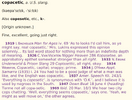Branson
Puritan Board Freshman
The standards have been used by the laity for almost 400 years, and I would assume many times in their homes, often without the help of a Pastor. Are we really so dumb now that they are no longer accessible to the lay man without the exposition of the learned? I don’t believe that is the case, at least from my experience. And even if there happens to be a word or phrase that one doesn’t know, almost everyone has some sort of immediate technological access for clarification.This is absolutely the case and raises another valid line of discussion. If the standards are used in the home, as they should be, no pastor will be present for interpretation. A denomination that doesn't expect the standards to be used and understood by the laity is one generation away from losing its doctrinal distinctives.
I've used KJV in our home from time to time just to be sure my kids don't lose the literature of that era, but even with that provision, when reading a passage from the standards, I tend to make the switch to modern pronouns and verb forms just to make sure the doctrine is understood.



